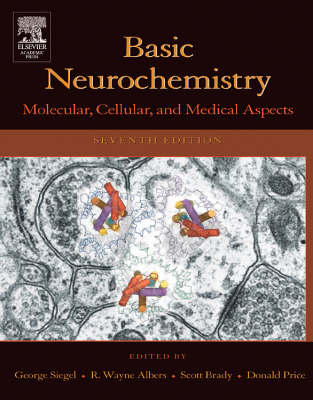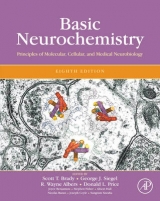
Basic Neurochemistry
Academic Press Inc (Verlag)
978-0-12-088397-4 (ISBN)
- Titel erscheint in neuer Auflage
- Artikel merken
Basic Neurochemistry: Molecular, Cellular and Medical Aspects, a comprehensive text on neurochemistry, is now updated and revised in its Seventh Edition. This well-established text has been recognized worldwide as a resource for postgraduate trainees and teachers in neurology, psychiatry, and basic neuroscience, as well as for graduate and postgraduate students and instructors in the neurosciences. It is an excellent source of information on basic biochemical processes in brain function and disease for qualifying examinations and continuing medical education.
Scott Brady is Head of the Department of Anatomy and Cell Biology at University of Illinois, Chicago, Illinois, USAUniversity of Illinois, Chicago, IL, USA. George Siegel is Emeritus Professor of Neruology at Loyola University Chicago Stritch School of Medicine; Chief of Neurology Service (retired), Edward Hines, Jr. Veterans Affairs Hospital, Chicago, IL, USA. OBITUARY FOR R. WAYNE ALBERS, August 5, 1928 - September 28, 2013 R. Wayne Albers, Ph.D., Scientist Emeritus, Chief of Section on Enzyme Chemistry (retired), Laboratory of Neurochemistry in the NINDS, NIH, Bethesda, MD, is a world-recognized neuroscientist most noted for his research in the field of membrane cation transport and neuronal excitability in the nervous system. Dr. Albers and physiologist R.L. Post performed the principal experiments leading to their now widely-held Albers-Post model for the mechanism of the cation transport enzyme, sodium-potassium-activated ATPase. Dr. Albers was one of the founding co-editors of the comprehensive text, Basic Neurochemistry: Molecular, Cellular and Medical Aspects, first published in 1972, continuing as co-editor for 8 editions, the latest having been published in 2012. After receiving his PhD at Washington University School of Medicine in 1954, Dr. Albers embarked on a distinguished career of research at the NIH, being a founding investigator in the first Laboratory of Neurochemistry. Dr. Albers was one of the first members of the American Society for Neurochemistry at its inception, serving on its Council and its Committees on Publications and Education and on Electronic Publications. He has served as Professor of Biochemistry at George Washington University, Faculty Member of the NIH Foundation for Advanced Education in the Sciences, Associate Editor of the Journal of Neurochemistry and of Experimental Neurology, and on the editorial boards of several journals. Dr. Albers passed away on September 28, 2013. He was 85 years old and is survived by his former wife, Frances Albers, their children Gail Morrell, Belinda Caron and Patricia Steinhoff, 6 grandchildren, and 8 great-grandchildren. He also had a son, the late Jonathan Albers. Dr. Albers was considered a gentleman, an excellent scientific colleague with a keen intellect and friend by all who worked with him. He will be sorely missed, not only by his family, but also by the entire neurochemistry community. George J. Siegel October 1, 2013
PART I: Cellular Neurochemistry and Neural Membranes
Chapter 1: Neurocellular Anatomy
Chapter 2: Cell Membrane Structures and Functions
Chapter 3: Lipids
Chapter 4: Myelin Formation, Structure and Biochemistry
Chapter 5: Membrane Transport
Chapter 6: Electrical Excitability and Ion Channels
Chapter 7: Cell Adhesion Molecules
Chapter 8: The Cytoskeleton of Neurons and Glia
Chapter 9: Intracellular Trafficking
PART II: Intercellular Signaling
Chapter 10: Synaptic Transmission and Cellular Signaling: An Overview
Chapter 11: Acetylcholine
Chapter 12: Catecholamines
Chapter 13: Serotonin
Chapter 14: Histamine
Chapter 15: Glutamate
Chapter 16: GABA and Glycine
Chapter 17: Purinergic Systems
Chapter 18: Peptides
PART III: Intracellular Signaling
Chapter 19: G Proteins
Chapter 20: Phosphoinositides
Chapter 21: Cyclic Nucleotides in the Nervous System
Chapter 22: Calcium
Chapter 23: Serine and Threonine Phosphorylation
Chapter 24: Tyrosine Phosphorylation
PART IV: Growth, Development and Differentiation
Chapter 25: Development
Chapter 26: Transcription Factors in the Central Nervous System
Chapter 27: Growth Factors
Chapter 28: Axonal Transport
Chapter 29: Stem Cells in the Nervous System
Chapter 30: Axonal Growth in the Adult Mammalian Nervous System: Regeneration and Compensatory Plasticity
PART V: Metabolism
Chapter 31: Energy Metabolism of the Brain
Chapter 32: Hypoxic–Ischemic Brain Injury and Oxidative Stress
Chapter 33: Eicosanoids, Docosanoids, Platelet-Activating Factor and Inflammation
Chapter 34: Metabolic Encephalopathies
Chapter 35: Apoptosis and Necrosis
PART VI: Inherited and Neurodegenerative Diseases
Chapter 36: Peripheral Neuropathy
Chapter 37: The Epilepsies: Phenotype and Mechanisms
Chapter 38: Diseases Involving Myelin
Chapter 39: Genetics of Neurodegenerative Diseases
Chapter 40: Disorders of Amino Acid Metabolism
Chapter 41: Lysosomal and Peroxisomal Diseases
Chapter 42: Diseases of Carbohydrate, Fatty Acid and Mitochondrial Metabolism
Chapter 43: Disorders of Muscle Excitability
Chapter 44: Motor Neuron Diseases
Chapter 45: Neurodegenerative a-Synucleinopathies and Tauopathies
Chapter 46: Neurotransmitters and Disorders of the Basal Ganglia
Chapter 47: Neurobiology of Alzheimer’s Disease
Chapter 48: Molecular Basis of Prion Diseases
PART VII: Sensory Transduction
Chapter 49: Molecular Biology of Vision
Chapter 50: Molecular Biology of Olfaction and Taste
Chapter 51: Molecular Biology of Hearing and Balance
PART VIII: Neural Processing and Behavior
Chapter 52: Endocrine Effects on the Brain and Their Relationship to Behavior
Chapter 53: Learning and Memory
Chapter 54: The Neurochemistry of Schizophrenia
Chapter 55: Neurobiology of Severe Mood and Anxiety Disorders
Chapter 56: Addiction
Chapter 57: Pain
Chapter 58: Neuroimaging
Glossary
Index
| Erscheint lt. Verlag | 11.11.2005 |
|---|---|
| Mitarbeit |
Chef-Herausgeber: Scott Brady, George Siegel |
| Zusatzinfo | Approx. 800 illustrations |
| Verlagsort | San Diego |
| Sprache | englisch |
| Maße | 216 x 276 mm |
| Gewicht | 2127 g |
| Themenwelt | Naturwissenschaften ► Biologie ► Humanbiologie |
| Naturwissenschaften ► Biologie ► Zoologie | |
| ISBN-10 | 0-12-088397-X / 012088397X |
| ISBN-13 | 978-0-12-088397-4 / 9780120883974 |
| Zustand | Neuware |
| Informationen gemäß Produktsicherheitsverordnung (GPSR) | |
| Haben Sie eine Frage zum Produkt? |
aus dem Bereich



